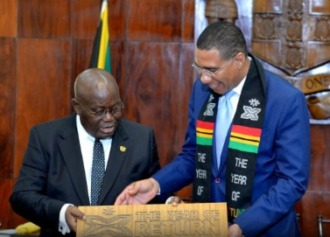Multilateral lenders have finalized a rescue package of almost $2 billion for Jamaica, one of the most indebted countries in the world, as the Caribbean heavyweight attempts to return to fiscal and economic health.
The International Monetary Fund said on Monday that it would lend Jamaica $958 million, some $200 million more than expected, while the World Bank and the Inter-American Development Bank said they will each lend $510 million.
For the bailout to go ahead, the IMF required the government to implement the second restructuring of Jamaica’s domestic debt in three years, with Jamaican bondholders agreeing in February to exchange J$860 billion ($9.1 billion) in existing debt for lower yield bonds and later maturity dates.
Although the failure of the 2010 debt exchange to resolve Jamaica’s financial crisis has damaged its credibility with markets, the government has repeatedly rejected concerns that it would not adhere to the new IMF program, which as well as the debt exchange also includes tax increases and wage freezes.
In an interview with the Financial Times, Peter Philips, Jamaica’s finance minister, said that the market’s scepticism was “understandable” after the previous government failed to implement tax, wage, and competitiveness reforms, but argued that the record so far of the new administration, which came to power in 2012, “should give some comfort”.
He said the government had met all the conditions required by the IMF, even exceeding some of the targets, and that “all told, we think that demonstrates the seriousness of purpose of this administration”.
“The success of this program crucially depends on full and timely policy implementation by Jamaica of a coordinated set of reforms, to strengthen the public finances, restore debt sustainability, enhance growth and bolster the resilience of the financial sector,” said the IMF in a statement.
“Jamaica has taken the bold decision to tackle the structural impediments to growth that have hindered its development for decades,” said the World Bank and the Inter-American Development Bank in a joint statement.
Read more: FT


